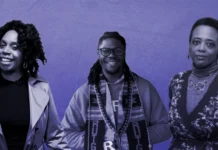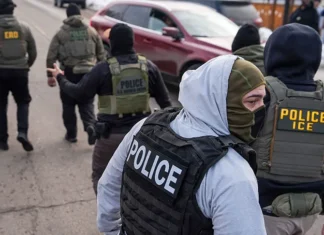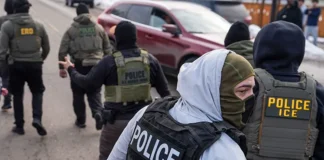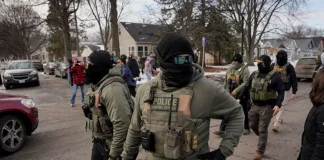
As protests against the proposed law enforcement training facility known as “Cop City” begin to gain national attention, From Students to Faculty, folks are doubling down on their commitment to stop the project.
Calvin Bell, a junior and political science major at Morehouse, is one of many college students fighting against the $90 million, 381-acre complex intended for police and firefighter training.
“I was one of those who has slowly become a spokesperson, along with some of my other brothers,” Bell says.
The facility he’s trying to stop, officially known as the Atlanta Public Safety Training Center, has drawn significant criticism from community organizers and activists since 2021. Critics say the project will irreparably harm the environment and further militarize the police.
Environmental activists have long raised concerns about “Cop City” due to its potential ecological impact. The facility is slated to be built in the Weelaunee (South River) Forest, a tract of undeveloped forested land that serves as an essential green space and carbon sink for the city. Activists say losing this green space would contribute to increased air pollution, decreased biodiversity, and the exacerbation of climate change.
Along with concern about the environmental impact, opposition to “Cop City” from the Black community also stems from fears of racial profiling, over-policing, and strained police-community relations. Critics argue that the allocated funds should be redirected to address systemic issues affecting Black residents, such as education and community development, rather than expanding policing resources.
“Cop City is a million-dollar venture that is being created to train firefighters, those in the medical fields, but also police officers,” Bell says. “The pervasiveness of policing itself is harmful.”
Although protests have been ongoing, on April 24, students from Agnes Scott College, Emory University, Georgia State University, Morehouse College, Georgia Institute of Technology, Spelman College, and Clark Atlanta University staged concurrent demonstrations following the release of the DeKalb County Medical Examiner’s autopsy report on environmental activist Manuel “Tortuguita” Paez Terán.
26-year-old Tortuguita had been an active protester in the anti-“Cop City” movement. They were shot 57 times at the Defend Atlanta Forest, Stop Cop City camp by Georgia State Troopers.
The report revealed no gunshot residue on Tortuguita’s hands, contradicting the Georgia Bureau of Investigation’s claims that he was killed after firing first at officers.
Bell got involved in organizing after attending an open forum at the Martin Luther King Chapel at Morehouse on January 28. That’s where he first openly expressed his thoughts on Cop City.
He also attended a teach-in at the African-American Hall of Fame which inspired him to get even more involved.
I’m “just one of many students who have taken the stage in front of the administration to voice their opinions,” he says.
Bell says that faculty and other students have not treated him differently due to his involvement in the Stop “Cop City” protests.
In February, 53 members of the Morehouse College faculty published an open letter calling “upon our civic leaders and fellow educators in Atlanta to denounce Cop City, to take immediate action to cancel the project, and to respond to the will of the people—and not merely the wealthy and well connected—in determining the character of our communities and the conduct of those who claim to serve and protect us.”
On March 25, Spelman alumnae also released an open letter opposing the development of Cop City. They wrote, “the fight for the forest is just the latest of Black-led, cross-racial coalitions to preserve Black communities and the natural environments that make them.”
In addition, they expressed their unequivocal and enthusiastic support of the student and faculty protests across Atlanta and the movement to defend Weelaunee Forest.
Bell says that the response to his activism has been overwhelmingly positive.
“If anything, I have been uplifted for my advocacy and have had people tell me that they appreciate my work as a scholar-activist,” he says. “This movement has allowed me to welcome in more voices and recruit more students who have similar sentiments.”
Meanwhile, Weelaunee People’s Park, a part of the South River Forest, is no longer open to the public. Instead, the forest is now surrounded by barricades and police officers.
Keyanna Jones, an activist who works with Community Movement Builders, a non-profit grassroots organization that focuses on fighting for Black liberation. She believes Weelaunee People’s Park was closed because it was a meeting spot for Stop Cop City organizers.
“It was a direct response to the fact that the movement was not slowing down,” Jones says.
She regularly protests against “Cop City,” and went to a rally against it at Emory University last week.
She and other protesters, including students, come together for a potluck each week. They share life skills — like how to live off the land — and meet outside of the South River Forest, usually on open land owned by a church nearby.
Although many Stop “Cop City” protesters are Black, not all Black folk in Atlanta oppose the training facility.
Some activists say that folks who are a part of “The Atlanta Way,” or the Black elite, have little interest in joining the fight against “Cop City.”
Students have sharply criticized Atlanta’s mayor Andre Dickens for his vocal support of Cop City.
At a recent forum at Morehouse about Cop City protests, Dickens reacted angrily to a student calling him a “sellout.”
“I ain’t never been no sellout,” Dickens snapped back. “You picked the wrong resume to pull on the race card.”
At a press conference on April 22, Dickens stated, “Let me be clear today: the Atlanta public safety training center is moving forward because we need it.”
Dickens was flanked by dozens of prominent Black men dressed in sharp suits during his remarks. Critics pointed out that many are part of organizations that accept funding from “Cop City” backers or are directly working for the project.
“The mayor cares about Black people in a certain tax bracket, those who can bring a level of affluence and power to him, furthering his reelection down the line,” Bell says.
“He has lost sight of those that are dealing with inequalities every day, who will slowly be pushed out and who will solely be disregarded because of the fact that they don’t fit that scope of the Black bourgeoisie.”
The city “is supposed to be the Mecca of Black people,” Bell says. And so, it seems the battle for Atlanta’s soul rages on, with the outcome bearing significant consequences for the environment, the Black community, and the city’s social fabric.















